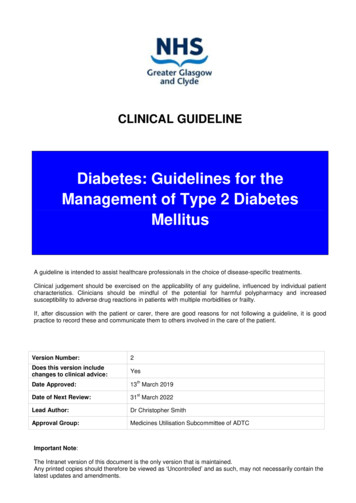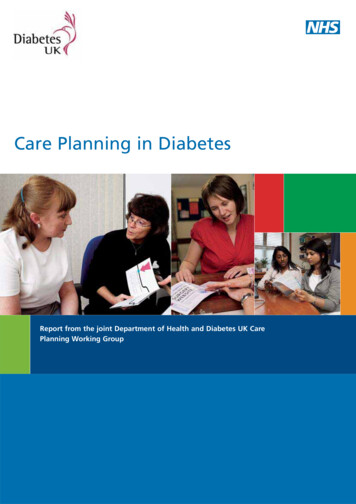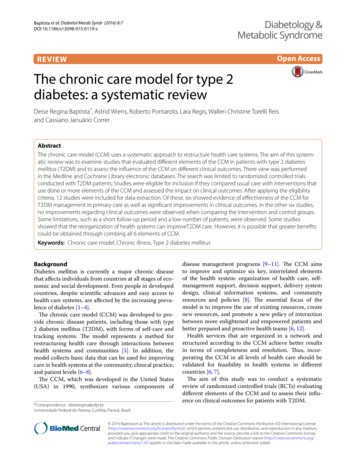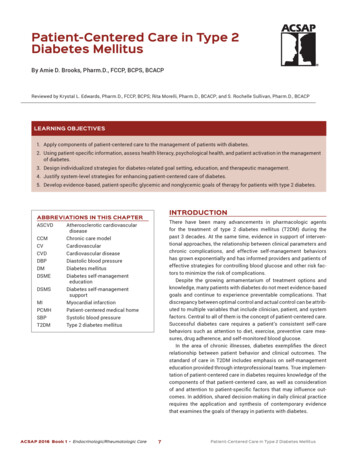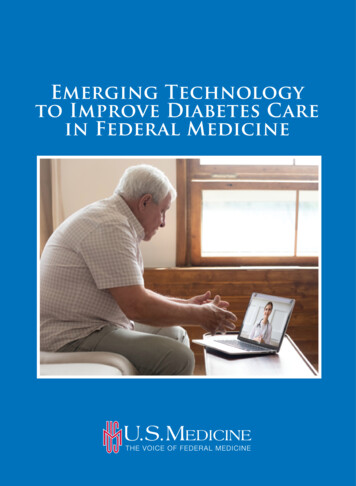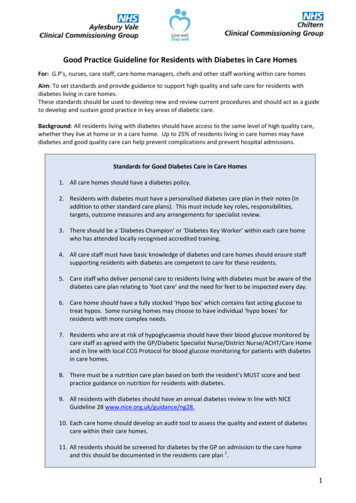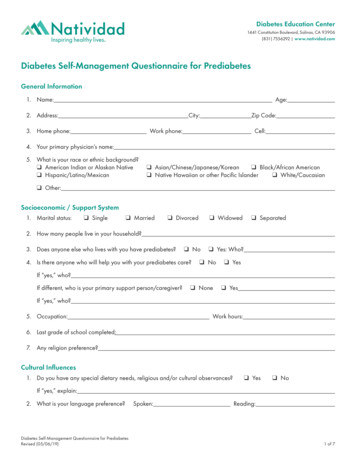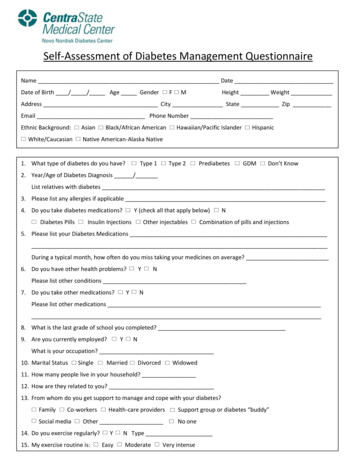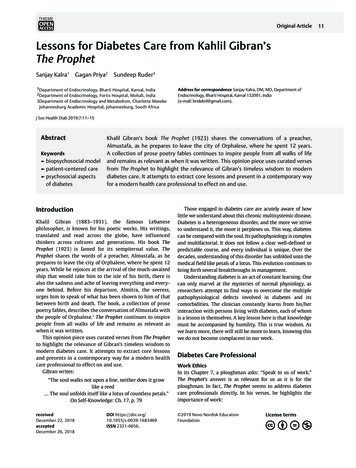
Transcription
Published online: 2019-06-28THIEMEOriginal ArticleLessons for Diabetes Care from Kahlil Gibran’sThe ProphetSanjay Kalra1Gagan Priya2Sundeep Ruder31 Department of Endocrinology, Bharti Hospital, Karnal, India2 Department of Endocrinology, Fortis Hospital, Mohali, India3Department of Endocrinology and Metabolism, Charlotte MaxekeJohannesburg Academic Hospital, Johannesburg, South AfricaAddress for correspondence Sanjay Kalra, DM, MD, Department ofEndocrinology, Bharti Hospital, Karnal 132001, India(e-mail: brideknl@gmail.com).J Soc Health Diab 2019;7:11–15AbstractKeywords biopsychosocial model patient-centered care psychosocial aspectsof diabetesKhalil Gibran’s book The Prophet (1923) shares the conversations of a preacher,Almustafa, as he prepares to leave the city of Orphalese, where he spent 12 years.A collection of prose poetry fables continues to inspire people from all walks of lifeand remains as relevant as when it was written. This opinion piece uses curated versesfrom The Prophet to highlight the relevance of Gibran’s timeless wisdom to moderndiabetes care. It attempts to extract core lessons and present in a contemporary wayfor a modern health care professional to effect on and use.IntroductionKhalil Gibran (1883–1931), the famous Lebanesephilosopher, is known for his poetic works. His writings,translated and read across the globe, have influencedthinkers across cultures and generations. His book TheProphet (1923) is famed for its sempiternal value. TheProphet shares the words of a preacher, Almustafa, as heprepares to leave the city of Orphalese, where he spent 12years. While he rejoices at the arrival of the much-awaitedship that would take him to the isle of his birth, there isalso the sadness and ache of leaving everything and everyone behind. Before his departure, Almitra, the seeress,urges him to speak of what has been shown to him of thatbetween birth and death. The book, a collection of prosepoetry fables, describes the conversation of Almustafa withthe people of Orphalese.1 The Prophet continues to inspirepeople from all walks of life and remains as relevant aswhen it was written.This opinion piece uses curated verses from The Prophetto highlight the relevance of Gibran’s timeless wisdom tomodern diabetes care. It attempts to extract core lessonsand presents in a contemporary way for a modern healthcare professional to effect on and use.Gibran writes:“The soul walks not upon a line, neither does it growlike a reed The soul unfolds itself like a lotus of countless petals.”On Self-Knowledge: Ch. 17, p. 79receivedDecember 22, 2018acceptedDecember 26, 2018DOI https://doi.org/10.1055/s-0039-1683469ISSN 2321-0656.Those engaged in diabetes care are acutely aware of howlittle we understand about this chronic multisystemic disease.Diabetes is a heterogeneous disorder, and the more we striveto understand it, the more it perplexes us. This way, diabetescan be compared with the soul. Its pathophysiology is complexand multifactorial. It does not follow a clear well-defined orpredictable course, and every individual is unique. Over thedecades, understanding of this disorder has unfolded unto themedical field like petals of a lotus. This evolution continues tobring forth several breakthroughs in management.Understanding diabetes is an act of constant learning. Onecan only marvel at the mysteries of normal physiology, asresearchers attempt to find ways to overcome the multiplepathophysiological defects involved in diabetes and itscomorbidities. The clinician constantly learns from his/herinteraction with persons living with diabetes, each of whomis a lesson in themselves. A key lesson here is that knowledgemust be accompanied by humility. This is true wisdom. Aswe learn more, there will still be more to learn, knowing thiswe do not become complacent in our work.Diabetes Care ProfessionalWork EthicsIn its Chapter 7, a ploughman asks: “Speak to us of work.”The Prophet’s answer is as relevant for us as it is for theploughman. In fact, The Prophet seems to address diabetescare professionals directly. In his verses, he highlights theimportance of work: 2019 Novo Nordisk EducationFoundation11
12Lessons for Diabetes Care from Kahlil Gibran’s The Prophet“You work that you may keep pace with the earth andsoul of the earth.”On Work: Ch. 7, p. 37A suggestion here is that natural law governs health and disease, and the more we are aligned to natural law, the more likelywe are to stay healthy. Is science not but our limited observationof natural law unfolding through investigation? Claude Bernardwho contributed to the coining of the term “homeostasis” suggested that the delicate balance within the human is maintainedthrough close and wise relation with the environment (nature).When you work, you are a flute through whose heartthe whispering of the hours turns to mu. This is in keepingwith the observations of Hippocrates and Epictetus whomentioned that the physician is a servant of “the art” (naturallaw) and we must guide our patients toward this.A practitioner should be knowledgeable, but that knowledgeis vain if he/she does not put it into practice. And work is futileif it is not done with love, dedication, and surrender. When thehealth care practitioner works with empathy and compassion,it would not only result in positive outcomes for the patient butalso improve professional satisfaction. Nothing in nature takeswithout giving, so a physician must give selflessly of himself.Gibran calls for “work with love” and defines it in poetic terms:“And all knowledge is vain save when there is work,And all work is empty save when there is love;And when you work with love you bind yourself to yourself, and to one another, and to God.”On Work: Ch. 7, p. 39Gibran then pointedly asks his readers:“And what is to work with love?”On Work: Ch. 7, p. 39The Prophet replies to the ploughman:“It is to weave the cloth with threads drawn from yourheart, even as if your beloved were to wear that cloth.It is to build a house with affection, even as if yourbeloved were to dwell in that house.It is to sow seeds with tenderness and reap the harvestwith joy, even as if your beloved were to eat the fruit.”On Work: Ch. 7, p. 39A century after he wrote the book, Gibran seems to speakdirectly to us. Would the patient-provider interaction, management plan, and outcomes not be significantly better ifthe provider treats the patient with the same care as he/shewould for a loved one?He is soft yet firm: in no unclear language, Gibran makesit clear that we should work with love, and not distaste. Thediabetes care professional must internalize this love for ourprofession, and empathy for patients, in our daily practice.“Work is love made visible. And if you cannot work withlove but only with distaste, it is better that you should leaveyour work and sit at the gate of the temple and take alms ofthose who work with joy.For if you bake bread with indifference, you bake a bitterbread that feeds but half man’s hunger.”On Work: Ch. 7, p. 41Journal of Social Health and DiabetesVol. 7No. 1/2019Kalra et al.Personal EthicsWhile significant progress is being made in the pharmacologicmanagement of diabetes, it is imperative that diabetes careprofessionals remain rooted in ethical practice. Beneficenceand nonmaleficence form the two core components ofbiomedical ethics in modern medicine. Gibran muses that itis our responsibility to share our knowledge and expertise topromote good health and well-being of others:“And there are those who give and know not pain ingiving, nor do they seek joy, nor give with mindfulness ofvirtue.”On Giving: Ch. 5, p. 28Medicine has always been regarded as a noble professionthrough civilizations and in all cultures. The Prophet remindsus of our “greater calling” and purpose:“Through the hands of such as these God speaks, andfrom behind their eyes He smiles upon the earth.”On Giving: Ch. 5, p. 31Physician burnout and compassion fatigue is well documented among diabetes care providers. But when the provider finds purpose in his/her work, it is not without its rewardsfor the diabetes care practitioner, for it is associated withgreater compassion satisfaction and enhanced professionalquality of life. When a physician works more toward a higherideal (unselfish) rather than a short-term incentive (selfish),his energy and inspiration improves. Fatigue can be a sign ofpersonalization of work and ego attachment.“There are those who give with joy, and that joy is theirreward.”On Giving: Ch. 5, p. 28Keeping in mind, the dynamics of modern economies, hecounsels moderation in financial dealings, as well as in lifestyle. These words attain greater relevance in today’s medicalcare ecosystem, characterized by mistrust and misunderstanding between patients and physicians:“Yet unless the exchange be in love and kindly justice, itwill but lead some to greed and others to hunger.”On Buying and Selling: Ch. 11, p. 52Person-Centered CareBiomedical ethics also encompass the principle of justiceand autonomy. Effective delivery of health care requires a partnership between the provider and the patient, ratherthan a paternalistic approach. Understandably, currentdiabetes practice focuses on person-centered care, as well asinformed decision making. Gibran seems to anticipate thisphilosophy, when he speaks to us of an ideal teacher, and theneed to respect each other’s attitudes and wishes. Chapter18, “On Teaching,” reports a conversation with a teacher:“If he [the teacher] is indeed wise he does not bid youenter the house of wisdom, but rather leads you to thethreshold of your own mind.”On Teaching: Ch. 18, p. 80The modern diabetes care professional functions not onlyas a medical care provider but also as a teacher and guide.
Lessons for Diabetes Care from Kahlil Gibran’s The ProphetTrue education is inculcating the ability to critically think andbecome self-sufficient. In this role, he/she often struggles tostrike a balance between his/her knowledge of disease and thepatient’s perception of the same. It is imperative for the practitioner to gently direct and motivate the patient toward makingappropriate lifestyle and therapeutic choices. However, muchhe/she may want the patient to behave in an ideal manner; itmust be remembered that the perceptions of every individualare determined by a multitude of factors and in keeping withcurrent science advocating individualized diabetes care:As Gibran writes:“For the vision of one man lends not its wings toanother man.”On Teaching: Ch. 18, p. 81“Your children are not your children.And though they are with you, yet they belong not to you.You may give them your love but not your thoughts.For they have their own thoughts.”On Children: Ch. 4, p. 23Clinical ApproachDiabetes care is becoming more and more complex as ourunderstanding of this disorder increases. There are severalconsensus statements, algorithms, and expert opinionsto guide the diabetes practitioner. They no doubt provideguidance for the practitioners, but they are not rule booksto abide by and the clinician needs to be aware of this. AsGibran suggests:“You delight in laying down laws, Yet you delight more inbreaking them.”“But to whom life is a rock, and the law is a chisel withwhich they would carve it in their own likeness?”“What shall I say of these, save that they too stand in thesunlight, but with their backs to the sun?”On Laws: Ch. 13, p. 65The Prophet beckons us to maintain concordance betweentheoretical knowledge and practical clinical sense. The idealdiabetes professional is one who achieves concordancebetween understanding of pathophysiology and prescriptionof therapy, as well as between his thoughts on one hand, andwords and action, on the other.“Who can separate his faith from his actions, or his belieffrom his occupation?”On Religion: Ch. 26, p. 108Today’s diabetes management strategies focus on cardiovascular and other long-term outcomes, and rightly so.Previous metabolic health, however, has a strong bearingupon long-term outcomes; this concept is termed metabolickarma or metabolic memory. Gibran immortalized thesescientific truths in a beautiful verse:“And let today embrace the past with remembrance, andthe future with longing.”On Time: Ch. 21, p. 89Clinical practice should take an individual’s pastmedical history into account, while planning interventionsKalra et al.that aim for favorable future long-term outcomes. Thefuture is a continuation of the past, modified by the present. Present actions lead to future effects. If present actionis perfect, the future effect is successful.Scope for ImprovementDiabetes care is a dynamic and evolving field,ever-changing, and ever-expanding. New understandingof pathophysiology has led to introduction of several newpharmacologic approaches. Simultaneously, old dogmassuch as those related to the use of metformin are beingbroken. There is always scope for improvement, and Gibrantries to instill the dynamic nature of truth in his readers:“Yet this we ask ere you leave us, that you speak to us andgive us of your truth”Seeress Almitra to the Prophet: Ch. 1, p. 11Say not, “I have found the truth,” but rather, “I have founda truth.”On Self-Knowledge: Ch. 17, p. 79The Person with DiabetesThe Prophet speaks not only to the diabetes careprofessional but to individuals living with diabetes. Theymay do well to heed his advice, which speaks for a balanced life, trustful adherence to physician-led care, andmaintaining emotional equipoise while coping with thestress of chronic disease.Health Care–Related BehaviorGibran is liberal in his advice, and we quote these verses forthe patient with a philosophical taste. He emphasizes theimportance of maintaining calm and tranquility and trustin the healer:“Therefore, trust the physician, and drink his remedy insilence and tranquility;For his hand, though heavy and hard, is guided by thetender hand of the Unseen”On Pain: Ch. 16, p. 77The patients would do well to gladly accept the advice ofhis care provider and attempt to understand that the aimof management is not just immediate symptom control butlong-term health. The diabetes care professional is like anarcher who aims that the arrow of good health maintains aswift and long-term trajectory:“The archer sees the mark upon the path of the infinite,and He bends you with His might that His arrows may goswift and far.Let your bending in the archer’s hand be for gladness;For even as He loves the arrow that flies, so He loves alsothe bow that is stable”On Children: Ch. 4, p. 24There is a great need for stability and continuity in medicalcare, and efforts need to be made by both provider as well asthe patient.Journal of Social Health and DiabetesVol. 7No. 1/201913
14Lessons for Diabetes Care from Kahlil Gibran’s The ProphetSelf-CareThe Prophet does not neglect key aspects of self-care that arevery relevant to self-management in diabetes. Indeed, thesuccess of any diabetes management plan rests on the patienthimself/herself:“It is the bitter potion by which the physician within youheals your sick self”On Pain: Ch. 6, p. 77Gibran focuses on healthy eating, parsimonious lifestyle,and stress management:“But since you must eat, let it then be an act ofworship”On Eating and Drinking: Ch. 6, p. 35“And when you crush an apple with your teeth, say to itin your heart,”“Your seeds shall live in my body. And together we shallrejoice through all the seasons”On Pain: Ch. 6, p. 35Perhaps, Gibran encourages outdoor activity as an essential part of healthy life. In the following verse, he glorifies thelife-giving or salutogenic properties of sunlight and air:“For the breath of life is in the sunlight and the hand oflife is in the wind”On Clothes Ch. 10, p. 50Diabetes DistressA certain amount of distress is inevitably felt by individualsliving with diabetes and/or its complications. However,Gibran emphasizes that pain awakens us to greaterunderstanding. Persons with diabetes should use this opportunity to improve their lives:“Your pain is the breaking of the shell that encloses yourunderstanding.”On Pain: Ch. 16, p. 74Even in individuals who have developed complications, thereis plenty in life to rejoice over. As The Prophet expounds, an individual should not become overly focused on pain and sufferingand understand the fleeting nature of both sorrow and joy:“And you would accept the seasons of your heart, evenas you have always accepted the seasons that pass over yourfields.And you watch with serenity through the winters of yourgrief.Much of your pain is self-chosen.”On Pain: Ch. 16, pp. 74–77An equanimous and balanced approach to emotions helpsmanage the vagaries of life in a stress-free manner. This hasbeen stressed by Gibran:“But I say unto you, they [joy and sorrow] areinseparable.Together they come, and when one sits alone with youat your board, remember that the other is asleep upon yourbed”On Joy and Sorrow: Ch. 8, p. 43Journal of Social Health and DiabetesVol. 7No. 1/2019Kalra et al.Team-Work and the SocietyDiabetes management is team work. Diabetes and personswith diabetes are inseparable. So too are diabetes care providers and persons living with diabetes. A relationship characterized by reciprocal respect, equipoise in dealing, andshared decision making is conducive for the health of allstakeholders:“Go to your fields and your gardens, and you shall learnthat it is the pleasure of the bee to gather honey from theflower.But is it also the pleasure of the flower to yield its honeyto the bee. For to the bee, a flower is a fountain of life. Andto the flower, a bee is a messenger of love. And to both, beeand flower, the giving and receiving of pleasure is a needand an ecstasy.”“People be in your pleasures like the flowers and thebees”On Pleasure: Ch. 24, p. 103Optimal diabetes care, however, is about teamwork. Thesociety needs to come together and join hands to overcome thediabetes pandemic. This is reflected in the following verses:“Like a procession you walk together towards yourgod-self.”The Farewell: Ch. 28“You are the way and the way farers”On Crime and Punishment: Ch. 11, p. 59SummaryDiabetes care is a never-ending journey, in which there arebound to be ups and downs. Outcomes may not always bewhat we desire. This should not stop us, however, from working toward them. As we travel on the road to diabetes care,we need to do our best.We leave our readers with these thoughts, immortalizedin The Prophet’s words:“You are good when you walk to your goal firmly andwith bold steps.”“Yet you are not evil when you go thither limping, Eventhose who limp go not backward”On Good and Evil: Ch. 22, p. 92During this journey, we must remain humble and strive toimprove ourselves in every possible manner:“We must understand that there is no single teacher, andno single answer.”“Was it I who spoke? Was I not also a listener?”The Farewell: Ch. 28, p. 117“Wise men have come to you to give you of their wisdom.I came to take of your wisdom.”Say not, I have found the truth, but rather, I have found atruth.On Self-Knowledge: Ch. 17, p. 79If we are able to understand and internalize these truthsof life, Gibran’s The Prophet will have served its purpose.
Lessons for Diabetes Care from Kahlil Gibran’s The ProphetConflict of InterestNone declared.AcknowledgmentsThe authors acknowledge the inspiration and guidancewe have received from Dr. Satya Sawant, Hisar, India, andBharti Kalra, Karnal, India, in understanding the philosophy of The Prophet.Kalra et al.Reference1 Gibran K. The Prophet. Mumbai, India: Wilco PublishingHouse; 2016Journal of Social Health and DiabetesVol. 7No. 1/201915
12 Lessons for Diabetes Care from Kahlil Gibran’s The Prophet Kalra et al. Journal of Social ealth and Diabetes Vol No / “You work that you may keep pace with the earth and soul of the earth.” On Work: Ch. 7, p. 37 A suggestion here is that natural law governs health and dis - ease, an
